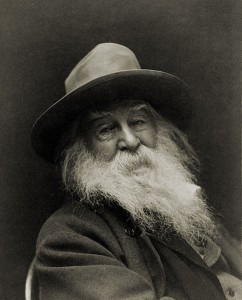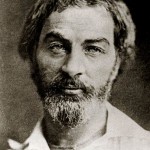EDGAR Allan POE’S SIGNIFICANCE
By Walt Whitman 1880

Jan. 1, ’80.—Walt Whitman on the Significance of Edgar Allan Poe: In diagnosing this disease called humanity—to assume for the nonce what seems a chief mood of the personality and writings of my subject—I have thought that poets, somewhere or other on the list, present the most mark’d indications. Comprehending artists in a mass, musicians, painters, actors, and so on, and considering each and all of them as radiations or flanges of that furious whirling wheel, poetry, the centre and axis of the whole, where else indeed may we so well investigate the causes, growths, tally-marks of the time—the age’s matter and malady?
By common consent there is nothing better for man or woman than a perfect and noble life, morally without flaw, happily balanced in activity, physically sound and pure, giving its due proportion, and no more, to the sympathetic, the human emotional element—a life, in all these, unhasting, unresting, untiring to the end. And yet there is another shape of personality dearer far to the artist-sense, (which likes the play of strongest lights and shades,) where the perfect character, the good, the heroic, although never attain’d, is never lost sight of, but through failures, sorrows, temporary downfalls, is return’d to again and again, and while often violated, is passionately adhered to as long as mind, muscles, voice, obey the power we call volition. This sort of personality we see more or less in Burns, Byron, Schiller, and George Sand. But we do not see it in Edgar Poe. (All this is the result of reading at intervals the last three days a new volume of his poems—I took it on my rambles down by the pond, and by degrees read it all through there.) While to the character first outlined the service Poe renders is certainly that entire contrast and contradiction which is next best to fully exemplifying it.
Almost without the first sign of moral principle, or of the concrete or its heroisms, or the simpler affections of the heart, Poe’s verses illustrate an intense faculty for technical and abstract beauty, with the rhyming art to excess, an incorrigible propensity toward nocturnal themes, a demoniac undertone behind every page—and, by final judgment, probably belong among the electric lights of imaginative literature, brilliant and dazzling, but with no heat. There is an indescribable magnetism about the poet’s life and reminiscences, as well as the poems. To one who could work out their subtle retracing and retrospect, the latter would make a close tally no doubt between the author’s birth and antecedents, his childhood and youth, his physique, his so-call’d education, his studies and associates, the literary and social Baltimore, Richmond, Philadelphia and New York, of those times—not only the places and circumstances in themselves, but often, very often, in a strange spurning of, and reaction from them all.
The following from a report in the Washington “Star” of November 16, 1875, may afford those who care for it something further of my point of view toward this interesting figure and influence of our era. There occurr’d about that date in Baltimore a public reburial of Poe’s remains, and dedication of a monument over the grave:
“Being in Washington on a visit at the time, ‘the old gray’ went over to Baltimore, and though ill from paralysis, consented to hobble up and silently take a seat on the platform, but refused to make any speech, saying, ‘I have felt a strong impulse to come over and be here to-day myself in memory of Poe, which I have obey’d, but not the slightest impulse to make a speech, which, my dear friends, must also be obeyed.’ In an informal circle, however, in conversation after the ceremonies, Whitman said: ‘For a long while, and until lately, I had a distaste for Poe’s writings. I wanted, and still want for poetry, the clear sun shining, and fresh air blowing—the strength and power of health, not of delirium, even amid the stormiest passions—with always the background of the eternal moralities. Non-complying with these requirements, Poe’s genius has yet conquer’d a special recognition for itself, and I too have come to fully admit it, and appreciate it and him.
 “‘In a dream I once had, I saw a vessel on the sea, at midnight, in a storm. It was no great full-rigg’d ship, nor majestic steamer, steering firmly through the gale, but seem’d one of those superb little schooner yachts I had often seen lying anchor’d, rocking so jauntily, in the waters around New York, or up Long Island sound—now flying uncontroll’d with torn sails and broken spars through the wild sleet and winds and waves of the night. On the deck was a slender, slight, beautiful figure, a dim man, apparently enjoying all the terror, the murk, and the dislocation of which he was the centre and the victim. That figure of my lurid dream might stand for Edgar Poe, his spirit, his fortunes, and his poems—themselves all lurid dreams.'”
“‘In a dream I once had, I saw a vessel on the sea, at midnight, in a storm. It was no great full-rigg’d ship, nor majestic steamer, steering firmly through the gale, but seem’d one of those superb little schooner yachts I had often seen lying anchor’d, rocking so jauntily, in the waters around New York, or up Long Island sound—now flying uncontroll’d with torn sails and broken spars through the wild sleet and winds and waves of the night. On the deck was a slender, slight, beautiful figure, a dim man, apparently enjoying all the terror, the murk, and the dislocation of which he was the centre and the victim. That figure of my lurid dream might stand for Edgar Poe, his spirit, his fortunes, and his poems—themselves all lurid dreams.'”
Much more may be said, but I most desired to exploit the idea put at the beginning. By its popular poets the calibres of an age, the weak spots of its embankments, its sub-currents, (often more significant than the biggest surface ones,) are unerringly indicated. The lush and the weird that have taken such extraordinary possession of Nineteenth century verse-lovers—what mean they? The inevitable tendency of poetic culture to morbidity, abnormal beauty—the sickliness of all technical thought or refinement in itself—the abnegation of the perennial and democratic concretes at first hand, the body, the earth and sea, sex and the like—and the substitution of something for them at second or third hand—what bearings have they on current pathological study?
- 100 Screenwriting Ideas to Get You Writing - January 20, 2026
- 100 Winter Storm Writing Prompts - January 17, 2026
- 100 Haunted House Story Starters: Craft Your Scariest Tale Yet - January 10, 2026



